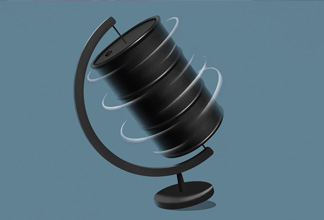Why Gratitude Can Be Good for Your Finances
Written by Tamar Satov
Published on October 15, 2019
minute read
Share:
As the sages have long told us, focusing on what we have rather than what we lack can make life that much richer. According to social science, that wisdom is right on the money. Expressing gratitude not only helps you feel like you have more — it can actually improve your finances. What's that? Emotions can be good for our wallets?
A 2014 academic study by researchers from Northeastern University, the University of California and Harvard Kennedy School set out to see how various emotions affect our behaviour with money. More specifically, researchers wanted to see if priming subjects to feel happy or grateful would reduce their desire for instant gratification, thus helping them wait for a larger reward in the future.
Participants in the study could choose to receive a smaller monetary payout on the spot or wait 30 days to get a bigger payout. But before making their choice, they were each randomly assigned to write about an event from their past. Depending on how they were assigned, they wrote about something that either made them feel neutral, happy or grateful. Those who were asked to write about a neutral or happy situation preferred the immediate payout of the smaller amount — a natural human tendency called "present bias." In short, present bias is the tendency to favour immediate rewards at the expense of long-term goals.
However, the subjects who were primed to feel grateful showed more patience and were more likely to delay gratification and wait for the larger payout. In other words, feelings of gratitude reduced financial impatience.
What's the takeaway? An emotion such as gratitude can be leveraged in your favour.
"Showing that emotion can foster self-control and discovering a way to reduce impatience with a simple gratitude exercise opens up tremendous possibilities for reducing a wide range of societal ills from impulse buying and insufficient saving to obesity and smoking," an assistant professor involved in the research was quoted as saying in a release announcing the study.
So if overcoming our present bias can help us make smarter long-term financial decisions, what are some ways we can exercise our gratitude muscles throughout the year?
Here are a few easy ways to get started:
Keep a gratitude journal
By writing down a few items every day that you are thankful for, you may eventually become more attuned to all the tiny good things in your life. For example, maybe it's that first sip of coffee in the morning or the stranger who held a door for you when your hands were full.
Volunteer
There's nothing like helping others in need to remind us to feel grateful for what we have.
Avoid the temptation to keep up with the Joneses
Comparing our real lives to the curated "highlight reels" that others populate their social-media feeds with can leave us feeling dissatisfied instead of grateful. Sometimes a break from social media can help us focus on what's good in our own lives.
A simple thank you
When you make a point of acknowledging the contributions of others, you can't help but feel grateful to have them around. You might find they reciprocate with their own thankfulness to you, which can only strengthen the feedback loop of gratitude.
**This article was updated on November 10, 2020.
RBC Direct Investing Inc. and Royal Bank of Canada are separate corporate entities which are affiliated. RBC Direct Investing Inc. is a wholly owned subsidiary of Royal Bank of Canada and is a Member of the Canadian Investment Regulatory Organization and the Canadian Investor Protection Fund. Royal Bank of Canada and certain of its issuers are related to RBC Direct Investing Inc. RBC Direct Investing Inc. does not provide investment advice or recommendations regarding the purchase or sale of any securities. Investors are responsible for their own investment decisions. RBC Direct Investing is a business name used by RBC Direct Investing Inc. ® / ™ Trademark(s) of Royal Bank of Canada. RBC and Royal Bank are registered trademarks of Royal Bank of Canada. Used under licence.
© Royal Bank of Canada 2025.
Any information, opinions or views provided in this document, including hyperlinks to the RBC Direct Investing Inc. website or the websites of its affiliates or third parties, are for your general information only, and are not intended to provide legal, investment, financial, accounting, tax or other professional advice. While information presented is believed to be factual and current, its accuracy is not guaranteed and it should not be regarded as a complete analysis of the subjects discussed. All expressions of opinion reflect the judgment of the author(s) as of the date of publication and are subject to change. No endorsement of any third parties or their advice, opinions, information, products or services is expressly given or implied by RBC Direct Investing Inc. or its affiliates. You should consult with your advisor before taking any action based upon the information contained in this document.
Furthermore, the products, services and securities referred to in this publication are only available in Canada and other jurisdictions where they may be legally offered for sale. Information available on the RBC Direct Investing website is intended for access by residents of Canada only, and should not be accessed from any jurisdiction outside Canada.
Explore More

The Hidden Costs of Being Single
How single Canadians can build wealth on their own terms
minute read

What Investors Can Learn from Hockey Star and RBC Olympian Sarah Nurse
Nurse's path to the podium reveals how preparation, planning and practice can turn potential into a golden opportunity
minute read

Crude Questions? A Look at Canada’s Oil Economy
What you need to know about Canada’s oil industry
minute read
Inspired Investor brings you personal stories, timely information and expert insights to empower your investment decisions. Visit About Us to find out more.







